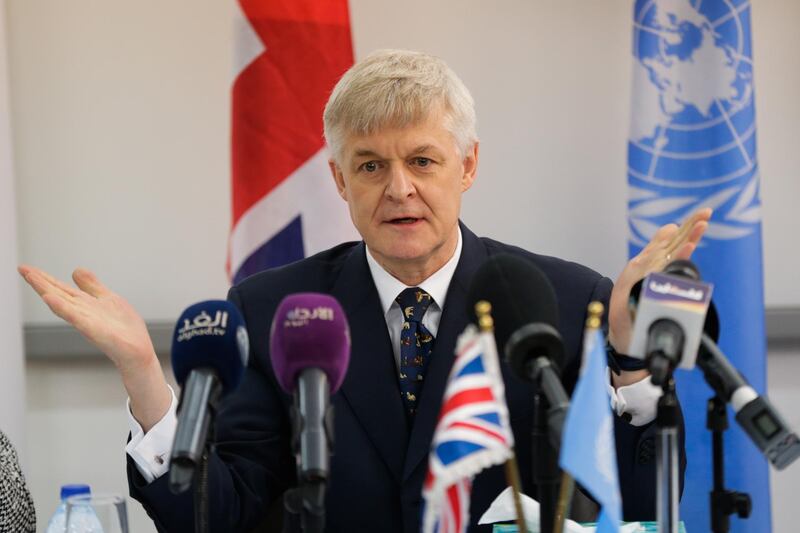The United Nations agency for Palestinian refugees has thanked Saudi Arabia for its $50 million contribution to offset crippling aid cuts by US President Donald Trump's administration, a day after Britain doubled its own funding.
At a press conference in Riyadh on Wednesday, director of the King Salman Humanitarian Aid and Relief Centre, Abdullah Al Rabeea, reaffirmed the Saudi pledge of $50 million in aid that was announced in April. The agency said contributions from the Gulf and European states has seen its deficit drastically slashed.
"We remain grateful to Saudi Arabia and all donors who have helped reduce our deficit, which was nearly half a billion US dollars following the defund by the Trump administration, and which now stands at 21 million," UNRWA spokesman Chris Gunness told The National.
"The response of our donors to the unprecedented financial and political crisis precipitated by the US decision sends a very strong signal that the international community will not tolerate unilateral attacks on the multilateral system of which UNRWA is a proud and longstanding member."
The press conference took place a day after the UK announced that it has more than doubled its annual assistance to the United Nations Relief and Works Agency for Palestine Refugees (UNRWA) for 2018, as the agency tries to narrow its budget deficit and sets its sights on raising funds to continue essential services into 2019.
Britain’s ambassador to Jordan Edward Oakden revealed that with a series of recent grants the UK has provided a total of $85 million (Dh312m) to UNRWA for 2018, more than twice its commitment for 2017 even as the United States announced massive cuts to its contribution.
Mr Oakden and UNRWA announced the increase in support at a press conference to unveil the latest tranche of British funds, £5 million which will be spent on 18,000 Palestinian refugees who fled from Syria to Jordan and faced having their essential cash assistance and medical services cut this month.
_______________
Read more:
UNRWA looks to Gulf countries for support in the long term
_______________
Palestinian refugees displaced to Jordan are completely reliant on UNRWA for cash assistance for housing, food, medical assistance and education, and have been hit hard by ongoing funding struggles.
Unlike Syrian refugees who have access to permanent residencies and work permits in Jordan, Syrian Palestinians are unable to work legally or access other UN assistance. More than 90% of these refugees are women and children, and rely on the grant to pay for fuel for heating, food, medical support and winter clothes.
"The reality is that the withdrawal of US funding means that others will have to step up to replace that," Mr Oakden told The National. "This is going to need a lot of work, but it is not impossible."
Britain’s top diplomat in Jordan said that there remains a “political will” in London and across Europe to continue their outsized support of UNRWA amid the ongoing absence of US funds going into 2019 and beyond.
With the increased funds from the UK, along with Germany, China, India, and $50 million each from the UAE, Kuwait, Qatar and Saudi Arabia, UNRWA raised what many are calling a “miraculous” $400 million in 2018, cutting its budget deficit down to $21 million.
"Many people were doubting that we would survive this year, but the international community has stood with us," Roger Davies, director of UNRWA Operations in Jordan, told The National, noting that the increased funds, combined with a scale-back of programs allowed UNRWA to continue essential services.
Budget issues this fall threatened to close UNRWA schools, which provide education for more than 500,000 Palestinian refugees, and health clinics that serve three million Palestines.
Yet, UNRWA faces a similar dilemma in 2019 as it projects another $1.2 billion budget despite recent programme cuts, with rising costs due to emergency services to Palestinian refugees affected by violence in Syria and in Gaza.
While 2018 saw the US provide an initial $60 million before cutting aid entirely, next year UNRWA will be starting without those initial funds, creating an even larger deficit to cover.
“Next year will be a challenge as we will be without any US support, and we must go back and ask for our partners and new donors to step up and provide this incredible support again,” Mr Davies said. “We are very aware of the dangers of donor fatigue.”
As part of these efforts, UNRWA officials say they are looking to Muslim-majority southeast Asia countries such as Malaysia and Indonesia, and to Latin America, home to Palestinian diaspora communities.
Another fundraising tool will be UNRWA’s accreditation by several Zakat funds, including the National Zakat Foundation Worldwide, and Indonesia’s National Zakat authority, as a legitimate destination under Sharia law for the Zakat tax compulsory for all Muslims.
Earlier this year, the US, long the single-largest contributor to UNRWA’s budget, froze and then cut $305 million in assistance earmarked for UNRWA’s budget.
The surprise funding cut and ongoing pressure from the Trump administration to dismantle UNRWA has been a threat to stability in Jordan, home to more than 2.2 million registered Palestinian refugees who rely on the agency for schools, healthcare, housing, cash assistance and employment.





